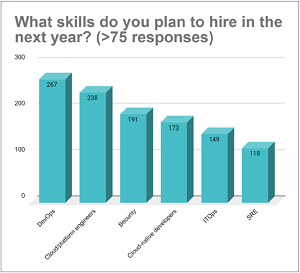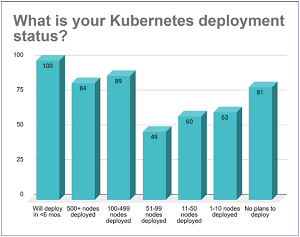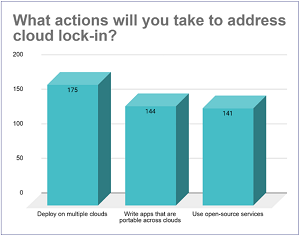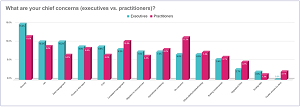News
What Cloud-Native Skills Are Most in Demand in 2022?
A new survey-based report from Platform9 on cloud-native enterprise trends in 2022 reveals the top talent that will be in demand in the new year.
The report from the open distributed cloud service vendor, "2022 Enterprise Trends in Cloud Native," was conducted to learn how enterprises are adopting cloud-native technologies, seeking data on investments and hiring plans, anticipated challenges, cloud lock-in concerns and more.
Included in the "more" is a question about what skills respondents plan to hire in the next year.
The answer? DevOps, cloud-platform engineering, cloud-native developers and security are the top hiring priorities in 2022, according to respondents.
"As cloud-native technologies go mainstream, companies struggle with balancing DevOps, cloud-native development, platform engineering, and legacy technology skills," the report said. "Survey respondents are clear about their hiring priority in 2022: focus on the skills needed to enable cloud native. Many companies are setting up cloud competency centers and dedicated cloud teams as they skill up. The fact that DevOps is the top hiring priority indicates the need for greater cloud operational and automation skills. However, it's challenging to find the right talent. An interviewee from a large telco said their focus is on hiring more SREs than DevOps engineers."
 [Click on image for larger view.] In-Demand Skills (source: Platform9).
[Click on image for larger view.] In-Demand Skills (source: Platform9).
As suggested above, the report also includes a couple quotes from interviewees on the subject:
"For telcos, network management and operations is a pain point. SREs and ITOps come to the rescue. Our hiring focus in 2022 is around these areas more than DevOps."
— Lead engineer at a large network services provider
"We are a heavily regulated industry. Security compliance, data regulation, and auditing need to be implemented in the cloud-native world, so we are investing heavily in DevSecOps. However, to scale this approach, we spent 2½ years building a shared self-service platform that many teams shared."
— Lead DevSecOps engineer at a multinational bank
Other highlights of the report as listed by Platform9 include:
- Kubernetes dominates container management: App containerization is accelerating, with 53 percent of respondents planning to containerize their current applications. Nearly 85 percent of respondents are using Kubernetes or have plans to deploy it in the next six months.
 [Click on image for larger view.] Kubernetes Domination (source: Platform9).
[Click on image for larger view.] Kubernetes Domination (source: Platform9).
- Executives across the board are looking for practical solutions to reduce vendor lock-in: While 61 percent of respondents have high or moderate concern about vendor lock-in, 71 percent of advanced users with larger deployments are even more concerned than early users. Additionally, managers, executives, and architects show higher level of concerns than engineers (65 percent). Plans for multiple cloud deployment lead as the number one action to address cloud lock-in, followed by using open-source services (#2) and writing portable apps (#3).
 [Click on image for larger view.] Lock-In Concerns (source: Platform9).
[Click on image for larger view.] Lock-In Concerns (source: Platform9).
- While security and operations concerned 91 percent of respondents, executives were more concerned about cost optimization, data management, and high availability while practitioner's challenges were more around day-2 operations such as upgrades, consistent management, observability, and troubleshooting.
 [Click on image for larger view.] Chief Concerns (source: Platform9).
[Click on image for larger view.] Chief Concerns (source: Platform9).
"This Platform9 survey concretely reflects concerns we have heard from enterprise and service provider users adopting container and cloud-native platforms," the report quotes — Roy Chua, founder and principal at AvidThink, as saying. "Evidence is pointing towards containers as today's preferred abstraction and packaging for enterprise application development and deployment. And now that we are a few years into mainstream use of containers, leading users are reflecting their learnings and concerns across strategic, scaling, and operational elements of container and cloud services."
Respondents to the survey, conducted between Dec. 15, 2021, and Jan. 8, 2022, included 526 architects, DevOps and cloud platform engineers, managers and executives across 85 industries and 450 unique companies.
About the Author
David Ramel is an editor and writer at Converge 360.